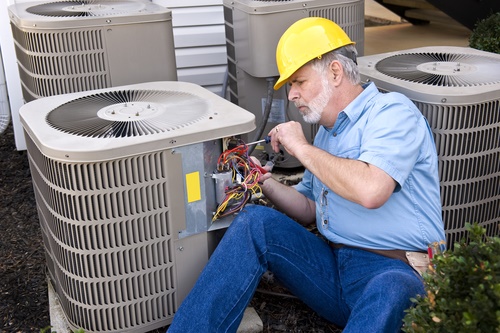If you want to become an heat, ventilation, and air conditioning (HVAC) technician, you must usually first pass a HVAC certification course. Licensing and certification requirements vary from state to state and, depending on where you live, they may include education, testing and/or experience in your chosen field.
State Licensing Information
The HVAC certification program in which the professional enrolls will depend on the state they live in. Some require that they take several HVAC certification exams in one particular area, or to focus on a specific type of machine or other component. Others want their students to enroll in HVAC certification programs that prepare them for entry-level positions upon completion of the program.
No matter where get certified, HVAC certification programs usually focus on topics such as:
- Installation and maintenance of HVAC systems in residential and commercial buildings
- Testing air quality
- Mechanics of climate control and temperature control systems
- Refrigeration and heating principles
- Fans, thermostats, ducts and other electronic parts
- Year-round maintenance of HVAC systems
One can train and study through tech schools, universities, or even online. The best course for preparing for HVAC certification is through accredited training.

Choose Test
HVAC certifications are not uniformly determined by one umbrella organization. Every area of the HVAC industry encourages, promotes and values certified technicians, because it demonstrates that they have mastered the wide range of HVAC duties. The North American Technician Excellence board (NATE) promotes certain types of training and testing, and a program or course recognized by NATE is usually the best bet. Many organizations, both physical and online, offer tests that carry this standard that the HVAC industry values.
Taking the Test
The student can often be tested by the same organization where they have completed the course of study. In some states, they may be required to have it administered by a state regulations commission or electrical board. As it has become the industry standard, taking the NATE HVAC qualification test is often all most employers look for. The exams can be administered at a local venue or online.
Why HVAC Certification
For anyone looking to become a heating, ventilation, and air conditioning specialist, obtaining certification is a great way to show prospective employers their competency. The credentials they achieve demonstrate a wide range of skills, and certified HVAC technicians have wider opportunities than those who are not certified, including working as system test and balance specialists, cost estimators, or building superintendents.
All our technicians are HVAC certified and trained. We would be more than happy to work on your heating and air conditioning requirements. Contact us today for more information.
Frequently Asked Questions: Becoming an HVAC Technician
1. What steps are required to become an HVAC technician?
To become an HVAC technician, you need to complete an HVAC certification course. Requirements vary by state but typically include education, hands-on training, and passing a certification exam. Accredited programs cover essential topics like system installation, air quality testing, and refrigeration principles.
2. How long does it take to get HVAC certified?
The duration to get HVAC certified can vary. Generally, certification programs range from six months to two years, depending on whether you pursue a diploma, certificate, or associate degree. Accelerated programs are available for those looking to enter the field quickly.
3. What is the best certification for HVAC technicians?
One of the most recognized certifications for HVAC technicians is the North American Technician Excellence (NATE) certification. It is highly valued in the industry and demonstrates a technician’s proficiency across a wide range of HVAC skills. Other reputable certifications include EPA Section 608 and HVAC Excellence.
4. What topics are covered in HVAC certification programs?
HVAC certification programs cover various essential topics, including the installation and maintenance of HVAC systems, air quality testing, refrigeration and heating principles, and the mechanics of climate control systems. Additionally, students learn about fans, thermostats, and ductwork.
5. How important is hands-on experience in HVAC training?
Hands-on experience is crucial in HVAC training. Practical skills in installing, maintaining, and repairing HVAC systems are developed through lab work and real-world internships. This experience ensures technicians are job-ready and can handle the complexities of HVAC systems in residential and commercial settings.
6. Can HVAC certification be obtained online?
Yes, many institutions offer online HVAC certification programs. These programs combine online coursework with practical, hands-on training components. While theoretical knowledge can be gained online, in-person labs or local internships are usually required to complete the certification.
7. What are the benefits of becoming a certified HVAC technician?
Certified HVAC technicians enjoy numerous benefits, including higher earning potential, job security, and more career opportunities. Certification demonstrates expertise and competency, making technicians more attractive to employers. Additionally, certified technicians can pursue specialized roles like system test and balance specialists or cost estimators.
8. How does state licensing affect HVAC certification?
State licensing requirements for HVAC technicians vary. Some states require additional testing or certification beyond standard HVAC training. It’s essential to check specific state regulations to ensure compliance and understand any extra steps needed to legally work as an HVAC technician in your area.
9. What role does the NATE certification play in the HVAC industry?
NATE certification is highly regarded in the HVAC industry. It signifies a technician’s expertise and knowledge, which can enhance job prospects and earning potential. Employers often prefer or require NATE-certified technicians due to the rigorous standards and comprehensive training associated with this certification.
10. How can I find an accredited HVAC certification program?
To find an accredited HVAC certification program, research institutions that offer programs recognized by industry organizations like NATE or HVAC Excellence. Consider programs that provide both theoretical knowledge and hands-on training. Online reviews and state boards can also help identify reputable schools.
Conclusion
Becoming an HVAC technician involves completing a comprehensive certification program that combines theoretical knowledge with practical skills. Achieving certification opens doors to various career opportunities and ensures you meet industry standards. For more information, contact our HVAC experts today.

